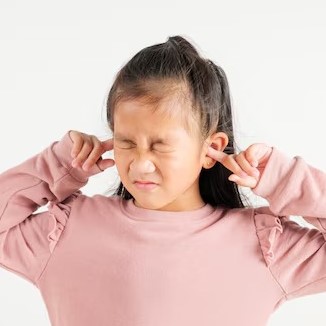Key pointers:
- Ear noises can sound like ringing, buzzing, squeaking, or clicking, each with a different possible cause.
- While many are temporary, persistent sounds may indicate underlying ear or sinus problems.
- ENT evaluation helps identify whether the cause is earwax, infection, sinus congestion, or middle-ear muscle spasms.
Why Do We Hear Strange Noises in the Ear?
Hearing unusual sounds that others cannot hear is common and often described as tinnitus. It may sound like ringing, hissing, buzzing, squeaking, or even rhythmic clicking. These noises may come and go, affect one or both ears, and vary in loudness. Most of the time, tinnitus is temporary and harmless, but when it persists or changes suddenly, it can signal a problem with the ear or nearby structures.
1. Ringing or Buzzing
Ringing, buzzing, or humming noises are the most common forms of tinnitus. They can arise from:
- Prolonged noise exposure (concerts, construction, headphones)
- Age-related hearing loss
- Earwax buildup blocking sound conduction
- Middle-ear infections causing fluid or pressure changes
Occasional ringing after loud noise exposure usually fades on its own. Persistent or one-sided ringing, however, should be assessed by an ENT specialist to rule out nerve-related hearing loss.
2. Squeaking or Crackling
A squeaking or crackling sound may occur when air moves through a partially blocked ear canal or middle ear. Common causes include:
- Earwax impaction
- Blocked Eustachian tube due to sinus allergies or a cold
- Rapid altitude changes (flying, diving, or elevator rides)
If the squeaking comes with a feeling of fullness or popping, it may mean the middle ear is adjusting to pressure changes. Decongestants, allergy management, or simple yawning/swallowing exercises can help, but if it persists, an ENT can assess for fluid buildup behind the eardrum.
3. Clicking or Pulsing
Hearing a clicking, thumping, or pulsing sound that follows your heartbeat is sometimes called objective tinnitus, meaning it has a physical cause within the ear or nearby blood vessels.
Possible causes include:
- Middle-ear muscle spasms, where small ear muscles contract rhythmically
- Blood flow changes near the ear (e.g., high blood pressure or vascular malformations)
- Temporomandibular joint (TMJ) issues, which cause joint clicks that echo near the ear
Because these sounds can come from movement or blood flow, an ENT may perform an otoscopic examination or refer for imaging to identify the source.
4. Crackling When Swallowing or Yawning
Hearing crackles when swallowing or yawning is often linked to Eustachian tube dysfunction, where the small passage connecting the middle ear to the throat doesn’t open properly.
This may happen with:
- Colds or sinus infections
- Allergic rhinitis
- Sudden altitude or pressure changes
Simple remedies like swallowing, chewing, or using nasal sprays can help equalise pressure. Chronic blockage, however, may need ENT evaluation to prevent long-term hearing problems.
5. Sudden New Noises with Hearing Loss
If you suddenly notice ringing or buzzing together with reduced hearing in one ear, it may be a sign of sudden sensorineural hearing loss. This is a medical urgency, early assessment and treatment within days can improve outcomes.
Protecting Your Ears and Preventing Noise-Related Symptoms
- Limit loud sound exposure by using earplugs at concerts or when using power tools.
- Avoid inserting objects into the ear, including cotton buds.
- Manage allergies and sinus problems that cause ear pressure.
- Get regular hearing checks if you work in noisy environments or experience recurrent tinnitus.
When to See an ENT Specialist
You should seek medical advice if:
- Ear noises persist for more than a week.
- The sound is only in one ear.
- You experience hearing loss, dizziness, or pain.
- The noise follows an ear infection or injury.
ENT specialists can perform hearing tests, ear examinations, and sometimes imaging to identify the cause and guide appropriate treatment.
Not all ear noises mean hearing loss, but they are your body’s way of signalling that something may need attention. Whether it’s ringing, clicking, or buzzing, timely evaluation helps protect your hearing and prevent chronic discomfort.
Get Personalised ENT Care for the Whole Family
If you or your child are hearing persistent noises in the ear, Dr Soon Sue Rene at Adult & Child ENT Specialists offers comprehensive evaluation and management for tinnitus, ear infections, and related conditions. Schedule a consultation to better understand your symptoms and explore suitable treatment options.
[Book an Appointment with Dr Soon Sue Rene]
Frequently Asked Questions
- Is tinnitus permanent? Not always. Many people experience temporary ringing or buzzing after exposure to loud sounds, an ear infection, or changes in pressure. However, if the noise lasts more than a week or is constant, it may signal an underlying issue such as hearing loss or nerve irritation. An ENT assessment helps determine whether the condition is reversible.
- Can stress or anxiety cause ear ringing? Yes. Emotional stress can heighten your awareness of tinnitus or make the sound seem louder. While stress alone may not directly cause tinnitus, it can worsen existing symptoms. Relaxation techniques, good sleep, and professional guidance can help manage both stress and tinnitus perception.
- Should I try home remedies or ear drops for ear noises? It’s best to avoid using over-the-counter ear drops or inserting objects without medical advice. Ear noises can have many causes, including infections, wax buildup, or nerve-related hearing issues. Using ear drops without a proper diagnosis may delay healing or cause irritation.
- Can children experience ear ringing or clicking too? Yes. Children can experience ear noises from ear infections, fluid buildup, or allergies affecting the Eustachian tube. They may describe it as “buzzing,” “whooshing,” or “tick-tick” sounds. Persistent complaints should be checked by a paediatric ENT specialist to ensure hearing and ear health are not affected.




